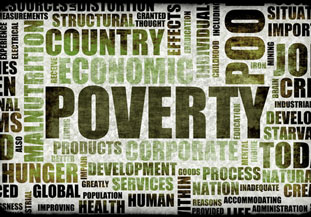Re-posted, in its entirety, with permission by the author, Richard Mayhew of Balloon Juice. There is a big difference between being broke and being poor. Keep reading.
Jan 282014
Paul Krugman is reraising a common and key insight into poverty which is not well captured by federal poverty guidelines:
“By security, I mean that you have enough resources and backup that the ordinary emergencies of life won’t plunge you into the abyss. This means having decent health insurance, reasonably stable employment, and enough financial assets that having to replace your car or your boiler isn’t a crisis.”
There is a clear distinction between being broke and being poor from this insight. Being broke means having no cash available, but having access to sufficient resources that the every day minor oh-shit moments are not a crisis as resources were available to manage the problem. Being poor means the minor oh-shit moments can easily become a crisis because there are no resources available.
When I was in college, I was consistently broke. I lived in a flophouse one summer with anywhere from seven to sixteen other people paying some share of the monthly rent. The most I paid was $86.75 for August. I sold myself to science as the pay and food was good, and I knew where there was free food offered by every department. As a student I was broke and under federal poverty guidelines, I was poor.
However, I had resources. I had good health insurance through my parents. When I woke up and my knee was swollen to the size of a grapefruit while the patella had dislocated itself, I swore in pain but not in concern about how to get through the day without seeing a doctor. I went to student health services after calculas, and then hopped a bus to see an orthopedic surgeon. She drained 38 CC of fluid. I owed $20 in co-pays and had to buy a cane. I would have rather spent the $20 on beer, but oh well, I could walk well enough in three days. When I was scrambling to come up with a security deposit for the first apartment that I would share with my girlfriend and now wife, I could go to my parents and ask that the security deposit and a good dinner with family be my graduation present.
This is a crucial distinction between being poor where there are few good choices over the long run as people operate from scarcity thinking and being broke. I was able to access resources and behave almost a Friedmanesque lifetime income hypothesis individual. (As a side note, this is why I discount the experiences of the 1% who claim they were poor in college — they might have been broke, but mommy and daddy could take care of anything) This is a weakness of the poverty guidelines as they are income based and not resources based. Some people may have rather low incomes but have the ability to call on resources in an oh-shit scenario, and others may have slightly above poverty level incomes but have no resources that turns an oh-shit scenario into a crisis.
Health insurance is one of the most important resource that is an on-call and hopefully not needed resource, so two individuals with the same income but where one has decent health insurance and the other does not have two very different abilities to absorb bad news from a doctor.
This post struck such a cord with me. I had to contact the author and ask permission to repost. Luckily, he graciously agreed. And as the mother of a sophomore in college this post resonates (if you aren’t there yet, just wait!). Resources matter. Big time.
Thanks again to Richard Mayhew.
